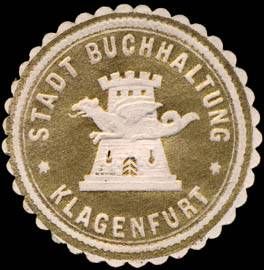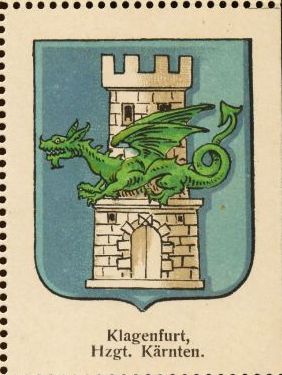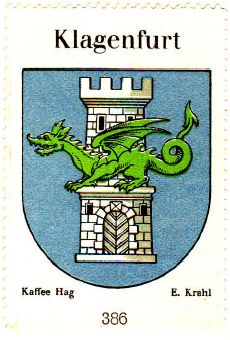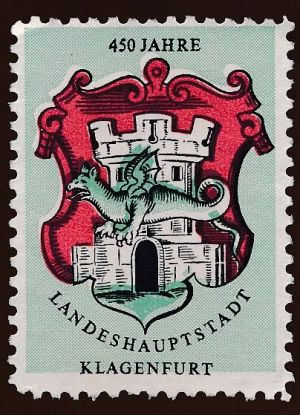Klagenfurt am Wörthersee: Difference between revisions
Knorrepoes (talk | contribs) |
Knorrepoes (talk | contribs) |
||
| Line 15: | Line 15: | ||
The dragon is derived from a local legend:<br> | The dragon is derived from a local legend:<br> | ||
A long time ago, when the Kings of Carinthia governed from Karnburg, there was a large area in their lands which was covered with woods and marshes. Not many people dared to go to this area. Many cattle and also several young virgins had disappeared in the area. The turned out to be inhabited by a dragon. To protect the lands and to observe the dragon, the King had a castle built close to the area. In addition he offered a large reward for the person who would be able to get rid of the dragon. A group of local farmers decided to take the risk. They took a big bull and put it on a chain with several hooks attached. When they entered the forest the dragon appeared and grabbed the bull. Thereby the hooks entered his flesh and wounded him. With much effort the farmers then were able to slain the wounded animal. Around the castle finally the village of Klagenfurt developed. | A long time ago, when the Kings of Carinthia governed from Karnburg, there was a large area in their lands which was covered with woods and marshes. Not many people dared to go to this area. Many cattle and also several young virgins had disappeared in the area. The turned out to be inhabited by a dragon. To protect the lands and to observe the dragon, the King had a castle built close to the area. In addition he offered a large reward for the person who would be able to get rid of the dragon. A group of local farmers decided to take the risk. They took a big bull and put it on a chain with several hooks attached. When they entered the forest the dragon appeared and grabbed the bull. Thereby the hooks entered his flesh and wounded him. With much effort the farmers then were able to slain the wounded animal. Around the castle finally the village of Klagenfurt developed. | ||
The base of the legend may lie in the discovery of a huge skull around 1335 near Klagenfurt. This skull, which turned out to be from a Woolly Rhinoceros, was shown for many centuries as the skull of the 'Lindwurm'. However, also this seems to be a legend, as already in the 13th century a dragon appeared on the city seals. The skull did this nicely fit in the legend, but was not the origin of the legend. | |||
{|align="center" | {|align="center" | ||
| Line 23: | Line 25: | ||
|align="center"|[[File:klagenfurt5.jpg|center|300 px|Wappen von {{PAGENAME}}]] <br/>450 years of Klagenfurt (1967) | |align="center"|[[File:klagenfurt5.jpg|center|300 px|Wappen von {{PAGENAME}}]] <br/>450 years of Klagenfurt (1967) | ||
|} | |} | ||
{{media}} | {{media}} | ||
[[Civic Heraldry Literature - Austria|Literature]] : Image provided by Karl Palfrader (k.palfrader@aon.at), legend translated from the Klagenfurt website. | [[Civic Heraldry Literature - Austria|Literature]] : Image provided by Karl Palfrader (k.palfrader@aon.at), legend translated from the Klagenfurt website. A large publication on the skull: Puschnig, R. : Der "Lindwurmschädel" von Klagenfurt. Carinthia II, 1935. | ||
[[Category:Austrian Municipalities K]] | [[Category:Austrian Municipalities K]] | ||
[[File:karnten.jpg|50 px|Link=Kärnten]][[Category:Kärnten]] | [[File:karnten.jpg|50 px|Link=Kärnten]][[Category:Kärnten]] | ||
Revision as of 06:30, 7 December 2021
| Heraldry of the World Wappen der Welt |
| Austrian heraldry portal Österreichische Wappen |
|
KLAGENFURT AM WÖRTHERSEE
State : Kärnten
District : Klagenfurt
Official blazon
Origin/meaning
The arms show a tower and a dragon (officially described as a serpent or Lindwurm).
The dragon is derived from a local legend:
A long time ago, when the Kings of Carinthia governed from Karnburg, there was a large area in their lands which was covered with woods and marshes. Not many people dared to go to this area. Many cattle and also several young virgins had disappeared in the area. The turned out to be inhabited by a dragon. To protect the lands and to observe the dragon, the King had a castle built close to the area. In addition he offered a large reward for the person who would be able to get rid of the dragon. A group of local farmers decided to take the risk. They took a big bull and put it on a chain with several hooks attached. When they entered the forest the dragon appeared and grabbed the bull. Thereby the hooks entered his flesh and wounded him. With much effort the farmers then were able to slain the wounded animal. Around the castle finally the village of Klagenfurt developed.
The base of the legend may lie in the discovery of a huge skull around 1335 near Klagenfurt. This skull, which turned out to be from a Woolly Rhinoceros, was shown for many centuries as the skull of the 'Lindwurm'. However, also this seems to be a legend, as already in the 13th century a dragon appeared on the city seals. The skull did this nicely fit in the legend, but was not the origin of the legend.
| Seal from around 1900 |
The arms in the Wappen-Sammlung (+/- 1910) |
| The arms in the Coffee Hag album +/- 1932 |
450 years of Klagenfurt (1967) |
Contact and Support
Partners:
Your logo here ?
Contact us
© since 1995, Heraldry of the World, Ralf Hartemink 
Index of the site
Literature : Image provided by Karl Palfrader (k.palfrader@aon.at), legend translated from the Klagenfurt website. A large publication on the skull: Puschnig, R. : Der "Lindwurmschädel" von Klagenfurt. Carinthia II, 1935.

















